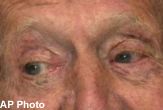Report: Over 5M Living With Alzheimer's

WASHINGTON (AP) -- More than 5 million Americans are living with Alzheimer's disease, a 10 percent increase since the last Alzheimer's Association estimate five years ago -- and a count that supports the long-forecast dementia epidemic as the population grays.
Age is the biggest risk factor, and the report to be released Tuesday shows the nation is on track for skyrocketing Alzheimer's once the baby boomers start turning 65 in 2011. Already, one in eight people 65 and older have the mind-destroying illness, and nearly one in two people over 85.
Unless scientists discover a way to delay Alzheimer's brain attack, some 7.7 million people are expected to have the disease by 2030, the report says. By 2050, that toll could reach 16 million.
Why? Ironically, in fighting heart disease, cancer and other diseases, "we're keeping people alive so they can live long enough to get Alzheimer's disease,'' explains association vice president Steve McConnell.
Indeed, government figures released last year that show small drops in deaths from most of the nation's leading killers between 2000 and 2004 -- even as deaths attributed to Alzheimer's disease increased 33 percent.
Yet the report also contains a startling finding: Between 200,000 and half a million people under age 65 have either early-onset Alzheimer's or another form of dementia. Researchers have been hard-pressed to estimate of the number of young sufferers.
"I think this has been drastically underreported,'' said Dr. Bill Thies, the Alzheimer's Association's medical director.
Get the world’s most fascinating discoveries delivered straight to your inbox.
He cites as an example a 55-year-old having problems at work, such as behavior changes or missing deadlines, that may be early signs of brain impairment but that go unrecognized until they progress to full-scale memory problems.
The new report -- based on federal population counts, not new disease research -- is the first update of the Alzheimer's toll since 2002, when it was estimated to afflict 4.5 million people. It comes as Congress is considering funding for research into Alzheimer's and other diseases.
No one knows what causes Alzheimer's creeping brain degeneration. It gradually robs sufferers of their memories and ability to care for themselves, eventually killing them. There is no known cure, and today's drugs only temporarily alleviate symptoms.
Because it complicates treatment for every other illness, the new report shows Medicare spends nearly three times as much for dementia patients' care as for the average beneficiary -- $13,207 a year vs. $4,454. Medicare's spending on dementia-related care is projected to double to more than $189 million by 2015.
That doesn't include the value of the unpaid round-the-clock care that families and friends provide the vast majority of Alzheimer's patients who live at home -- a tab the new report calculates at almost $83 billion-- or nursing home costs.
There are nine drugs in late-stage clinical trials, including a few that aim to slow Alzheimer's worsening. If such drugs pan out, delaying Alzheimer's symptoms by even a few years could cut by millions the coming decades' predicted toll, the report notes.
- Top 10 Mysterious Diseases
- Loneliness Could Boost Alzheimer's Risk
- Alzheimer's Find: Molecular Janitors Quit Cleaning Up
- Video: Alzheimer's Switch
 Live Science Plus
Live Science Plus





